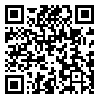1. Shuman J, Kennedy H, DeWitt P, Edelblute A, Wamboldt MZ. Group music therapy impacts mood states of adolescents in a psychiatric hospital setting. Arts Psychother. 2016;49:50–6. [
DOI]
2. Sharma M, Jagdev T. Use of music therapy for enhancing self-esteem among academically stressed adolescents. Pakistan Journal of Psychological Research. 2012;27(1):53–64.
3. Gooding LF. The effect of a music therapy social skills training program on improving social competence in children and adolescents with social skills deficits. J Music Ther. 2011;48(4):440–62. [
DOI]
4. Soleimani E, Senobar L. Effectiveness of music therapy in state-trait anxiety rate of addicts in drug-free rehabilitation stage. Etiadpajohi. 2016;9(35):149–62. [Persian] [
Article]
5. Lin ST, Yang P, Lai CY, Su YY, Yeh YC, Huang MF, et al. Mental health implications of music: insight from neuroscientific and clinical studies. Harv Rev Psychiatry. 2011;19(1):34–46. [
DOI]
6. Silverman MJ. Effects of group songwriting on motivation and readiness for treatment on patients in detoxification: a randomized wait-list effectiveness study. J Music Ther. 2012;49(4):414–29. [
DOI]
7. Salehi M, Norozi Khalili M, Hojjat SK, Salehi M, Danesh A. Prevalence of internet addiction and associated factors among medical students from Mashhad, Iran in 2013. Iran Red Crescent Med J. 2014;16(5):e17256. [
DOI]
8. Pourseyed Mosayi SF, Mousavi SL, Kafi Sm. Comparison and relationship between stress and craving in opiate and industrial addicts. Quarterly Journal of Research on Addiction. 2013;6(24):9-26. [
Article]
9. Ekhtiari H, Behzadi A, Oghabian M, Edalati H, Mokri A. Evaluation of visual cues inducing drug craving in intravenous heroin users. Advances in Cognitive Sciences. 2006;8(3):43-51. [
Article]
10. Pontes HM, Szabo A, Griffiths MD. The impact of Internet-based specific activities on the perceptions of Internet addiction, quality of life, and excessive usage: a cross-sectional study. Addict Behav Rep. 2015;1:19–25. [
DOI]
11. Laudet AB. The case for considering quality of life in addiction research and clinical practice. Addict Sci Clin Pract. 2011;6(1):44–55.
12. Lincoln A, Paasche-Orlow MK, Cheng DM, Lloyd-Travaglini C, Caruso C, Saitz R, et al. Impact of health literacy on depressive symptoms and mental health-related quality of life among adults with addiction. J Gen Intern Med. 2006;21(8):818–22. [
DOI]
13. Dougherty KM. Music therapy in the treatment of the alcoholic client. J Music Ther. 1984;4(1):47–54. [
DOI]
14. Silverman MJ. Effects of a single lyric analysis intervention on withdrawal and craving with inpatients on a detoxification unit: a cluster-randomized effectiveness study. Subst Use Misuse. 2016;51(2):241–9. [
DOI]
15. Hohmann L, Bradt J, Stegemann T, Koelsch S. Effects of music therapy and music-based interventions in the treatment of substance use disorders: a systematic review. Plos One. 2017;12(11):e0187363. [
DOI]
16. Ware JE, Gandek B. Overview of the SF-36 health survey and the International Quality of Life Assessment (IQOLA) project. J Clin Epidemiol. 1998;51(11):903–12. [
DOI]
17. Kousha S, Varasteh A. The effectiveness of music therapy on depression, quality of life and happiness of women with depression. Rooyesh. 2018;6(4):149–70. [Persian] [
Article]
18. Askary P, Khayat A. The effectiveness of music therapy on severity of pain, perceived stress and happiness in adolescents with leukemia. Positive Psychology Research. 2018;3(4):15–28. [Persian] [
Article]
19. Grocke D, Bloch S, Castle D. The effect of group music therapy on quality of life for participants living with a severe and enduring mental illness. J Music Ther. 2009;46(2):90–104. [
DOI]
20. Ware JE, Sherbourne CD. The MOS 36-item short-form health survey (SF-36): I. conceptual framework and item selection. Med Care. 1992;30(6):473–83.
21. Jafari H, Lahsaeizadeh S, Jafari P, Karimi M. Quality of life in thalassemia major: reliability and validity of the Persian version of the SF-36 Questionnaire. J Postgrad Med. 2008;54(4):273–5.
22. Franken IH, Hendriks VM, Van Den Brink W. Initial validation of two opiate craving questionnaires: the Obsessive-Compulsive Drug Use Scale and the Desires for Drug Questionnaire. Addict Behav. 2002;27(5):675–85. [
DOI]
23. Hassani-Abharian P, Mokri A, Ganjgahi H, Oghabian MA, Ekhtiari H. Validation for Persian versions of "Desire for Drug Questionnaire" and "Obsessive Compulsive Drug Use Scale" in heroin dependents. Arch Iran Med. 2016;19(9):10–23.
24. Gardstrom SC, Klemm A, Murphy KM. Women's perceptions of the usefulness of group music therapy in addictions recovery. Nord J Music Ther. 2017;26(4):338–58. [
DOI]
25. Aletraris L, Paino M, Edmond MB, Roman PM, Bride BE. The use of art and music therapy in substance abuse treatment programs. J Addict Nurs. 2014;25(4):190–6. [
DOI]





